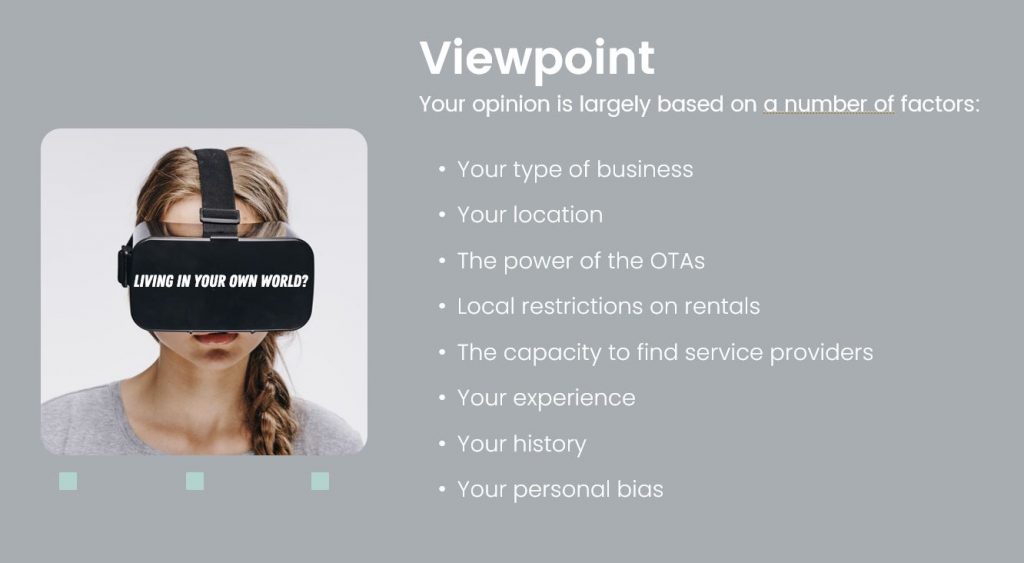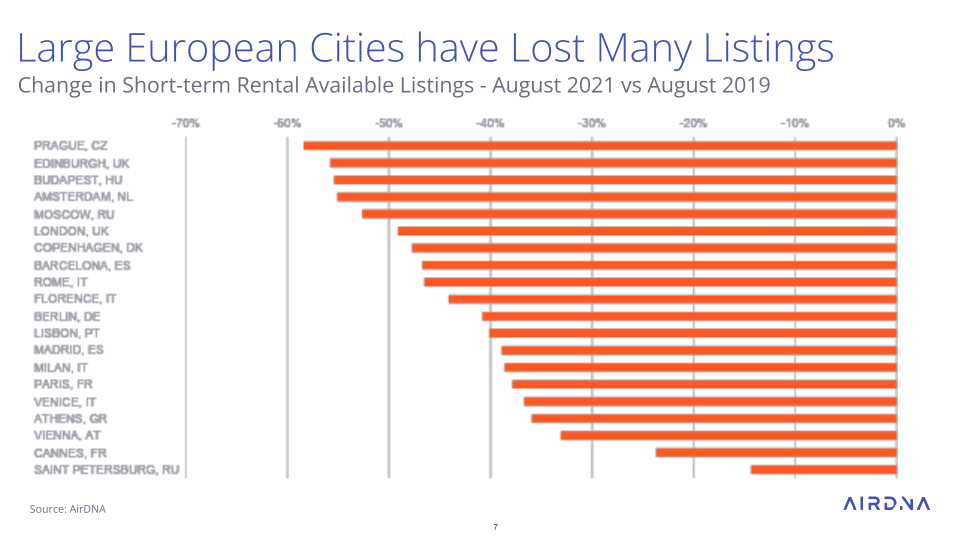 Welcome to the sixth Yes Consulting vacation rentals newsletter. The Lighthouse is for hosts, managers, agencies, and operators in the short term rental sector.
Welcome to the sixth Yes Consulting vacation rentals newsletter. The Lighthouse is for hosts, managers, agencies, and operators in the short term rental sector.
WHAT’S COMING?
My last newsletter followed previous editions in format, with several sections: “Market Trends, Data, Tips & Tricks, Company Sales and Acquisitions, this month I have taken a new approach (again) and am focussed on what some may call the “Big Picture” but in particular “What’s Coming”
As my colleagues and peers have noted the industry is red hot especially since Airbnb’s successful IPO almost a year ago, Hometogo’s IPO, Marriott’s Homes & Villas growth and the pending SPACs. This has resulted in an increasing raft of published information that covers significant and wide-ranging information that focuses on every aspect of the business some in very great detail. Some news channels are neutral in their approach and some have a clear bias in their presentation of content. As usual, readers beware, disinformation is everywhere. From now on for all you good folk who want a deep and independent analysis of specific products, sites, details, opinions, the site to visit is RentalScaleUp from Thibault Masson. who also has a consulting business helping navigate the complexities of this industry.
This particular newsletter in the future is intended to question the current thinking that influences the market as a whole and focuses on what it will mean to owners, agencies and investors post 2021 and attempts to look over the horizon or through the mist.
The question is this:
Are local and national authorities using sledgehammers to crack nuts, is it justified and what can be done to avoid this?
This is the article that really stimulated this particular newsletter. If you are an EU reader then this article in Wired Magazine will highlight the maelstrom appearing. If you’re wondering how the conversation is going, read this quote:-
In one question from the Commission’s public consultation — which is asking for views on the type of rules and requirements for STRs that “could be acceptable” — it suggests a number of responses, including registration and authorization obligations on all hosts or only on professional hosts; and limits on the number of nights, amount of income generated and number of rooms that can be rented by peers.
At the end of this list it also asks for a response to the suggestion of a “total ban on STRs”.
Hyperlocal Business – That’s most likely you!
In terms of what’s coming and how it may affect you, then we need to define the “you”. The vast majority of the market is “hyper-local”, spread across the globe with millions of owners and somewhere between 20 & 50,000 managers/agencies, depending on who you ask and how they are defined.
 One thing is very clear, the markets are very different across the globe, even more so in Covid. I highlight this point because of the thousands of hyperlocal businesses and their approach: portfolios types, price points, age of business, guest demographic, seasonal variations, languages and more which makes for a hundred different opinions on what is happening. This is a slide from the excellent VRWS conference in Annecy I attended which illustrates the point.
One thing is very clear, the markets are very different across the globe, even more so in Covid. I highlight this point because of the thousands of hyperlocal businesses and their approach: portfolios types, price points, age of business, guest demographic, seasonal variations, languages and more which makes for a hundred different opinions on what is happening. This is a slide from the excellent VRWS conference in Annecy I attended which illustrates the point.
Are you a middle ground manager or independent owner?
As many US companies will know, breaking the back of a global market is not easy and means adapting to new cultural approaches and local drivers. To a degree, this is the reason many locations still have little penetration by OTAs, but there are other reasons and these may be related to the mix of guest demographic, language challenges, local levels of technology and reasons for travel.
This industry has a nasty (or inventive) habit of mushrooming new businesses and these constantly nibble away at the established companies. Small is easier, very big is easier, the middle ground can be very hard. The new entrants can provide limitless personal attention to owners (who know little of the industry and its machinations) and often have boundless energy from the company founder. Big companies can throw money at brand and technology but aren’t brilliant at personal and local, but these businesses are growth focussed by hook or by crook and with capital. They all have the same basic challenges but those that perform poorly with guest-facing operations and real estate management are often the ones to disappear first and the ones that give the industry a bad name.
Addressing this can add margins, improve reputation and increase bookings., not to mention adding to the balance sheet, offering sustenance and survival if hard times appear (again).
STANDARDS, GOVERNANCE AND THE “P” WORD.
If anyone has any doubt about this trend then ask why there are endless discussions happening across the globe on why the large corporations are trying to influence the decision-makers as they plan for more control and standardisation for the “public good”. Managing numbers of properties and guest/local interaction at a hyper-local level is going to become mainstream and will require national oversights too.
This industry has definitely influenced the Millennials and their family ambitions and not just for vacations but for second or even primary home purchases to rent. This report provides a great wealth of information and if you read one thing this month, this report should be it, “The Future of US Millennial Travel” (the quote below is from page 63). There are going to be many more rentals apparently, which means more hyperlocal, untrained and often unprepared small businesses arising.
with a whopping 53% of those who are considering buying or would like to buy a vacation home one day saying they were “somewhat” or “very likely” to purchase a vacation home before buying a primary residence
BACKLASH
Airbnb and its counterparts are the most likely to suffer from regulations and already witnessing restricted night stays in many of its destinations.
- Working with real estate companies
- Back as far as 2016, Home Sharers Clubs
- A whole list of public policy movements
- Airbnb’s (claimed lead) at a European level
- Documentation at a local level purporting to support the industry (Edinburgh)
- Community Integrity plan with VRBO
- Airbnb’s “city portal”. A first of its kind resource for Governments.
- Wired.com summarised the money vs Jersey fight
- Washington bans unhosted STR
Airbnb has spent much of the last decade fighting for legitimacy in cities around the world, earning them an infamous reputation as a deep-pocketed public company prone to litigation and substantial PR activity. The company has sued cities such as Boston, Miami Beach, Santa Monica, and even its hometown of San Francisco and it has spent hundreds of thousands of dollars hiring signature gatherers to help overturn local restrictions.
There is no doubt that there are increasing demands on regulation and although Airbnb is influential it may be no match for thousands of destinations, millions of local neighbourhoods and those individuals with political ambitions. These local governments are challenging the supply chain, their qualifications, their standards, their approach. Most destinations want tourism and visitors, but only under their control and here is where the problems start. What for some has been years of steady income, a decent cottage industry with no issues, has through the increase in inventory, now exposed the underbelly of the industry.
Just to reinforce this an extract from AirDNA is shown below:-

Looking at the graph above, we can see those medium-sized cities that normally attracts a lot of foreigners have been hit hard. The impact is even bigger if local municipalities pass new restrictions on short-term rentals between 2019 and 2021. Case in point: Prague (-58%) and Amsterdam (-55%). Now consider post-Covid and when/if things get back to normal. Already there is a shortage of accommodation across the world and especially for those that enjoyed the swell of STR over the last few years. Housing and rental shortages now abound as this report demonstrates.
Just to add some cream to the cake, this great report on 127,000+ complaints about Airbnb highlights these challenges and the need for change.

Social responsibility
There is little any individual or local business can do about the increasing density of rentals and its effect if you are already a host or manager but all can be more socially responsible and work with guests to ensure they cause no issues and also bring business to the local community in a well-mannered way.
It is very tempting to title this narrative as “Professionalisation” but is a much over-used term in STR. The word tries to align with the general hospitality sector which has many layers of training, plus compulsory and voluntary opt-in schemes and checks and measures that offer guest guarantees on many levels. There is almost no doubt that some of this structuring will be compulsory and find its way into the 15+ million rentals worldwide, with a slow start. I for one am convinced it will become both a local, national and even an EU directive and is already in place in some countries, cities and destinations.
One thing is certain and that is that the guest has expectations and addressing these points one by one, will put all pro-active renters ahead of the game. These future compliance issues fall into a few simple categories and in so doing they underpin the OTA narrative of TRUST. Travellers do seek the confidence that they are making the best possible decision for their trip, and that translates into “trust” for OTAs because they offer a bigger and often better choice, with content and relevant search results in an efficient and beautiful user experience with clear messaging. The guest has a belief in size and substance, but they expect the platform to ensure the following be addressed for their 15%+ fee.
a) Legal: The guest seldom questions whether their accommodation is actually legally allowed to be let and also insured for such.
b) Heath & Safety: As with a) a guest assumes that all appliances are working, are performing correctly and tested to regulatory standards if electrical or gas-operated or involve water immersion or sanitary flow.
c) Cleanliness: With cleanliness always at the top of complaints and poor Wi-Fi a close second, Covid has amplified awareness.
d) Small untruths: What a guest sees and what they book is what a guest expects!
e) Customer service: Every decent hotel and hospitality business knows the customer comes first and this is super-important. Rentals often fall a poor second.
The stats below are from 2018 and pre-Covid, (so taken with a reserve) are taken from the Allianz Travel Insurance Economy Index, headlined as “Half of Americans Unlikely to Use Sharing Economy Services for 2018 Summer Travel, Despite Reporting High Familiarity and Better Value”

Why would that be? The telling comment from this report is the following:
This year, Americans are likely to rate traditional services as superior to sharing economy services, with traditional services seen as offering the better product, booking experience, customer support when things go wrong and overall experience.
Why micro & hyper-local rental models can benefit from standards & compliance
If we first consider a macro approach, the OTAs are at the pinnacle of choice but are completely reliant on guest reviews and host compliance and the suppliers level of local service and attitude.
Not too long ago a certain Brian Chesky announced that Airbnb would “Verify all 7 million properties“. To read a few comments on this and why try the Airbnb forum. Despite this laudable approach, it was always a mountain too high and a peak too far.
If anybody knew that this was going to be a hard task surely it is the CEO of Airbnb? It can only be achieved at this scale through the use of technology and third-party companies that have no skin in the booking game. It requires local involvement and governance by competent and knowledgeable organisations.
The internet is alive with past issues related to deaths and Airbnb advice but as a “neutral marketplace (remember that term?) it is impossible to validate anything at such scale except through digital application. At a micro-level however as a small management company or owner, the task is significantly easier and the booking platforms and your guests will also appreciate it. If this is supported by third party accreditation or audits and marketed as such, this will add to your own #bookdirect opportunity and increase conversions. The approach also adds a level of “professionalism (had to use that word) that new owners who are seeking representation will appreciate.
Even large managers who do not provide full-service struggle to have detailed knowledge of their property portfolio. Even those offering full service often end up charging more to owners for the continual auditing. The bigger they get the harder it becomes! For once being small is a bonus and is one of the large corporations Achilles heels, which will be addressed through the use of technology and remote inspections.
Bottom-up and top-down
Anyone in the industry cannot have failed to notice the volume of press and activity by local authorities, state representatives and city councils. With such a volume of properties having an impact on tourism and housing and neighbourhoods, the outcomes are obvious. Despite the fact that the major OTAs are constantly monitoring guest profiles, there will always be bad actors which exacerbate and highlights the neighbourhood’s increase in rentals.
Bottom-up means that the industry will need to address its own issues at a micro and property independent level, Top-down, means the major marketing platforms and authorities need to work together to ensure compliance and adherence to local social, planning, and tourism challenges. This means sharing data on income, capacity, occupancy, ownership. This is not just for tax purposes, but to provide a socially managed environment with a level playing field, This probably starts with the self-registration of rental properties.
Registration is compulsory in many cities and regions already but it is not policed well and damages those who do adhere to the rules as they carry the financial and potential restrictions issued through the lack of governance or oversight. With global warming and “sustainability” the centrepiece for this century and the sheer pace of STR market growth plus ease of entry, expect and be ready for change.
What can you do?
If you vote for a Government or in a local election, you already have the mindset to effect change. From a purely commercial approach, creating defence and increasing your compliance, supported by great customer service and taking note of social challenges locally is a real start. If a group collective can do this, it will increase awareness and put a small amount back into the community. This is a positive action and guards against hyperlocal threats.
How do you do it?
The obvious way is to address your business is to ensure compliance. No one argues that you can’t drive if you own a driving license. They can argue your driving is poor and this means you need to address why. This is parallel to guest service. Actually proving you have addressed all these things poses a problem as we witnessed by the UK’s “We’re Good to Go” program, where it was simply a matter of ticking a box, similar to Airbnb’s 28-page instructions on hygiene. Which Magazine a very well respected independent review business quoted:
VisitBritain Covid badge scheme endorses 12,640 accommodation providers, but just 3% have been inspected and none removed following complaints
The only real way to ensure guest confidence, host surety, and defend against formalised and poorly analysed change by authorities is to simply address the issues. Marking your own homework or MOT’ing your own car is not a great practice, so using a third-party accredited company makes sense. It provides an authentic badged result and can be promoted online and offline through platforms and marketing materials. It is also cost-effective and will attract better reviews, higher rankings and easily pay for itself.
Get ahead of the game and be ready for when compliance becomes compulsory and as the reference below in “More Reading” quotes “Standardised Uniqueness” will reap rewards.
Advert:-
These two companies (I have worked for the former for a few months) have created a partnership to bring third-party cost-effective governance and accreditation to the UK. Using a combination of app-based checks measures and training, with the UK leader in hospitality accreditation, brings all the tools and opportunity to become a leader and help stop the bad actors from disrupting the industry and effecting sledgehammer changes.
UK readers can read more here and download the app (Free)
MORE READING:
The latest VRMIntel magazine is out and well worth reading:
- Page 25. Protecting your right to rent (VRMA and Inhabit IQ)
- Page 31. Know before you grow (Amy Hinote)
- Page 55. Harnessing our Industry’s Recovery (Simon Lehman and Nicolas Galantini) which reflects some of this posts focus on “Standardised Uniqueness
CERTIFICATION & COMPLIANCE
- Properly Inc – The leading quality management app
- Quality in Tourism – The UK’s leading quality management company with “Safe, Clean and Legal” certification
- iPrac – Global Trust Accrediatation for professionals
DATA
- AirDNA – Gain valuable insights into the performance of over 10 million property rentals across 80,000 cities worldwide.
- SeeTranparent – Analyses 35 million Airbnb, Vrbo & booking.com vacation rental listings worldwide
Consultancies
AJL Atelier – The go-to short term rental consultancy.



